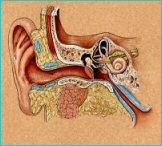Vertigo

Workings of the ear:
In the ear there is a specific nerve which carries information about hearing and balance to the brain this nerve is called the eighth cranial nerve- vestibulocochlear nerve. To confuse you further this nerve is then called different names.
The hearing information is carried on the:-
- Acoustic nerve
- Auditory nerve
- Cochlear nerve
The balance information is carried on the
Combined they make up the eighth cranial nerve- vestibulocochlear nerve.
^ Back to Top
What is Vertigo?
Vertigo and dizziness both come under the umbrella of balance disorders. This is where there is the illusion of movement when no movement is happening.
Signs of dizziness may include:
- Spinning /tumbling /falling
- loss of balance
- Nausea /sickness/ hangover effect
- Unsteadiness/imbalance
- Wooziness
- Light headed /floating
- Weak and faint
- Feeling tired
- Difficulty concentrating
^ Back to Top
Balance can be affected by:
- Feeling off balance, stumbling, difficulty with walking in a straight line or when turning a corner
- coordination problems /lopsided to one side
- tendency to look down to ground yourself
- The head may be held at a particular angle / tilted position
- Inclination to hold onto something when standing/walking
- Holding the head while seated /looking up
- Awareness of changes in walking surfaces or footwear
- Aches and pains in the muscle groups due to poor posture/neck and shoulders
Vision can be affected when:
- You have trouble with focusing and keeping track of items
- Images are blurred or you experience double vision
- Words on the page appear to move either bouncing or floating
- You can suffer sensitivity to glare, flickering lights and fluorescent strip lights.
- Night blindness – difficulty in adjusting to the darkness
- Your depth perception can be altered
^ Back to Top
Hearing can be affected
- Hearing can be distorted or fluctuate
- You can suffer from Tinnitus – this is a noise which sufferers”hear”. The noise can be described in a variety of ways buzzing, ringing, roaring or whooshing amongst others; it is not an external sound.
- You may become more sensitive to load noises and sudden noise can make the vertigo worse
- Unaccounted for ear pain
- Sensation of fullness in the ears with sensitivity to pressure changes
^ Back to Top
What will the GP do?
If you are suffering from any of these symptoms you will need to visit your GP to confirm a diagnosis. When you go to your GP with dizziness they will be looking for various signs which give indicators as to which balance disorder you are suffering from.
- They will check out your ears for wax build up as this can be cause an infection which may be linked to your imbalance.
- They will then look at your balance to see how you are able to stand without swaying, and how you are able to walk in a straight line
- Your arms and legs reflexes will be checked along with your strength in your limbs
- The sensations in your limbs may also be checked –this is to see if nerves are being affected
- There is a test called the Dix-Hallpike test which sometimes can be done to locate the cause of the vertigo. This test indicates more clearly if the vertigo originates from either the inner ear or the central nervous system – the test can make you feel dizzy and sick afterwards it is a good idea to have someone along to look after you and drive you home.
Once your doctor has assessed your condition and taken your medical history they may well be able to determine if you have one of the following conditions:-
Please Note: The information provided here should not be used for diagnosis or treatment of any medical condition. A medical practitioner should always be consulted for diagnosis and treatment of all medical conditions.
Click here to tell a friend/family member about this page
|











